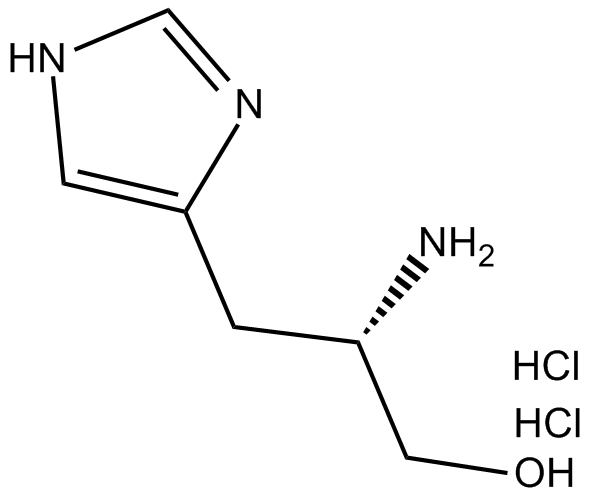L-Histidinol (hydrochloride) (Synonyms: (S)-Histidinol) |
| Catalog No.GC16438 |
L-Histidinol (hydrochloride) is an endogenous metabolite.
Products are for research use only. Not for human use. We do not sell to patients.

Cas No.: 1596-64-1
Sample solution is provided at 25 µL, 10mM.
L-Histidinol is an intermediate in the biosynthesis of the amino acid L-histidine.
L-Histidine biosynthesis is a metabolic pathway present in bacteria, archaea, lower eukaryotes, as well as plants. L-histidine biosynthesis has been studied mainly in Escherichia coli and Salmonella typhimurium, revealing fundamental regulatory processes in bacteria.
In vitro: Preliminary experiments were done to investigate the cytotoxic effect of L-histidinol on cultured EAC cells. Results showed that L-histidinol up to 4 mM had no cytotoxic effects on EAC cells. Doxorubicin alone showed concentration-dependent cytotoxic effects. L-Histidinol combination with doxorubicin led to significant potentiation of doxorubicin cytotoxicity to EAC cells compared to doxorubicin alone. The concentration that caused 50% growth inhibition in EAC cells after 24 h incubation was about 0.2 μg/ml, whereas it was 0.1 μg/ml when L-histidinol was added to culture medium [1].
In vivo: L-Histidinol at 250 mg/kg for five consecutive doses before doxorubicin single injection could enhance the antitumour activity of doxorubicin in EAC-bearing mice as demonstrated by a significant increase in average life span and cure rate of mice. In normal mice, L-histidinol, in the same dose regimen, could not alter the acute cardiotoxicity and lethality of doxorubicin [1].
Clinical trial: So far, no clinical study has been conducted.
Reference:
[1] Al-Shabanah OA, Badary OA, Al-Gharably NM, Al-Sawaf HA. Effects of L-histidinol on the antitumour activity and acute cardiotoxicity of doxorubicin in mice. Pharmacol Res. 1998 Sep;38(3):225-30.
Average Rating: 5 (Based on Reviews and 16 reference(s) in Google Scholar.)
GLPBIO products are for RESEARCH USE ONLY. Please make sure your review or question is research based.
Required fields are marked with *




















